Join the ‘War on Plastic’ with Plastic Free July (+ 3 Ideas for Plastic Free Veterans)
Another year, another Plastic Free July – and the appetite for living with less plastic is stronger than ever! More and more of us are concerned about plastic pollution and more importantly, determined to do something about plastic use in our own lives.
Plastic Free July always swings around at exactly the right time of year. Never heard of it before? Plastic Free July is a free-to-join challenge that runs during the month of July. It encourages us to choose to refuse single-use plastic, and be part of a movement that is not only raising awareness but taking action and sharing solutions.
I first took part in my first Plastic Free July back in 2012, when I was one of about 400 participants. Since then the challenge has grown exponentially, and in 2019 it was estimated that 250 million people from 177 different countries took part.
If you’d like to be registered for this year’s challenge, you can do so via the official Plastic Free July website.
I’ve written about Plastic Free July every year since my first challenge, and this year is no different in that respect. But I always try to approach it from a different angle, and this year I wanted to reach out to the plastic-free veterans.
There are plenty of articles for plastic-free beginners; I’ve written a number of them over the years. Here is last year’s contribution: 5 Tips to Get Prepped For Plastic Free July (and Living with Less Plastic). (There are plenty more in the archive).
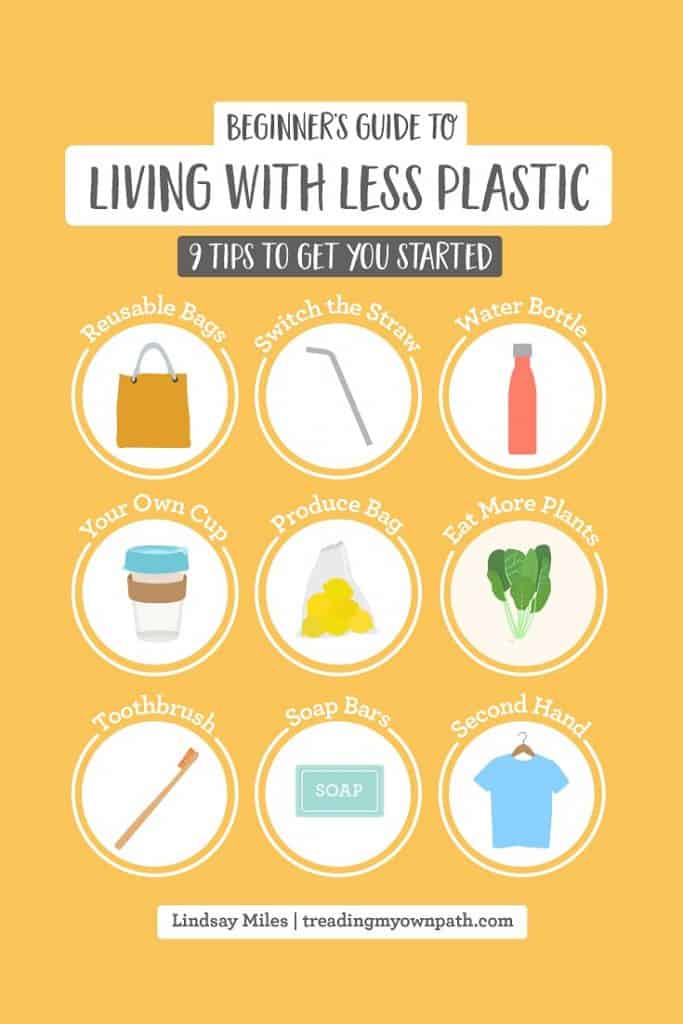
I also created this graphic and accompanying (free) eBook to give you more ideas to get started.
But for those coming back for a second, third, fourth or more year, getting those same beginner’s tips you received in year one can seem a little… well, repetitive.
So today’s post is for you.
3 Plastic Free July Ideas for Plastic-Free Veterans
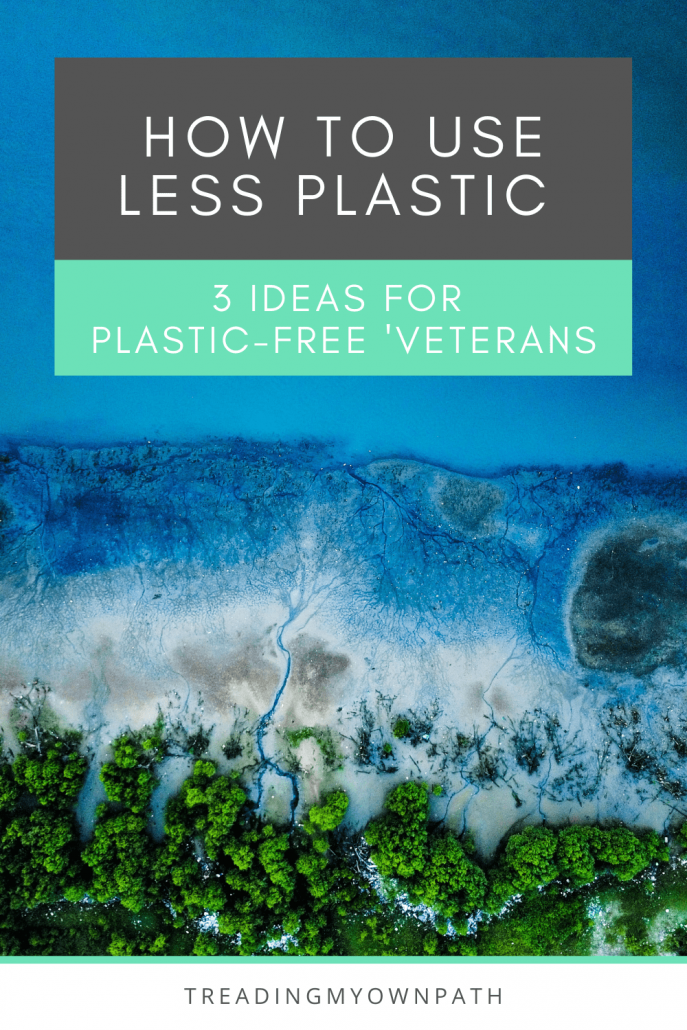
Find Your ‘One More Thing’ Swap
You’re a pro at bringing your reusable bags to the store, you remember to refuse the plastic straw, you opt to dine-in rather than getting those takeaway containers and you’re a regular at the bulk store. Hurrah!
But that doesn’t mean there isn’t still something more to do or somewhere else to improve.
- Take another look at the contents of your landfill bin and your recycling bin, and see if there’s anything in there that could be swapped out for something plastic-free;
- Consider revisiting something that you tried in previous years and decided was too hard – maybe times have changed and this year is the year you succeed;
- Try to make something new from scratch: maybe a food item, a cleaning recipe or a personal care product. That doesn’t mean committing to make it from scratch forevermore! It’s simply about experimenting with change;
- Maybe there’s something that is too expensive, impractical or time-consuming to become a permanent change in your life, but you can commit to making this change for 31 days during July to show solidarity with the movement and do your bit.
Plastic Free July isn’t just about refusing plastic. It’s about learning new skills, examining our habits and challenging ourselves to do better.
Take the Challenge Beyond Your Own Habits
Those first years, Plastic Free July is all about changing habits, making swaps and settling into new routines. Trying to remember our reusables and investigate all the alternatives takes up a lot of energy, and time.
But new habits eventually become ingrained, and the time we once spent figuring out all of this stuff is freed up again. Plastic Free July is a great time to spread the refuse single-use plastic message to people who haven’t heard of it before.
Maybe that means pinning up some posters at work, or persuading your local cafe and shops to get on board with the challenge.
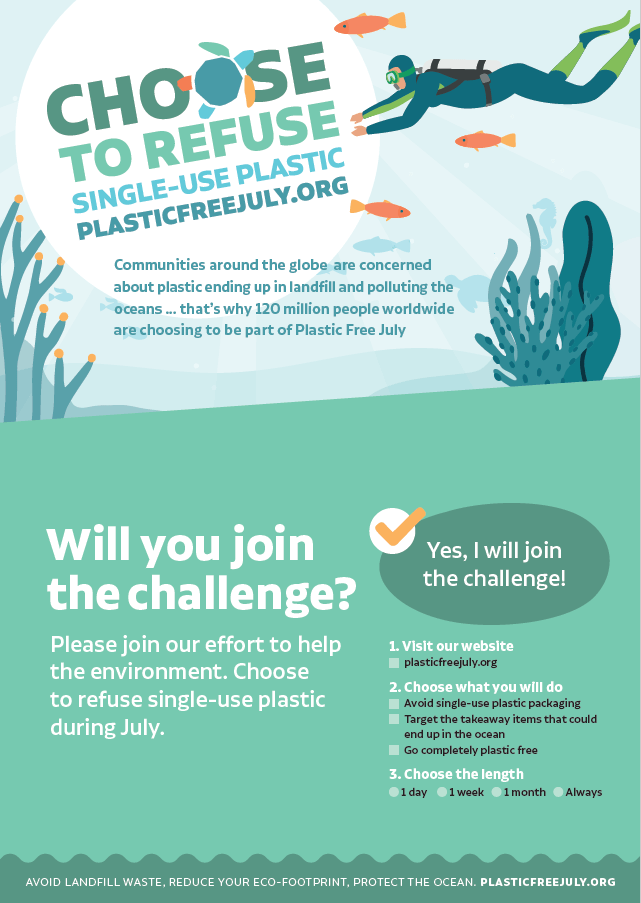
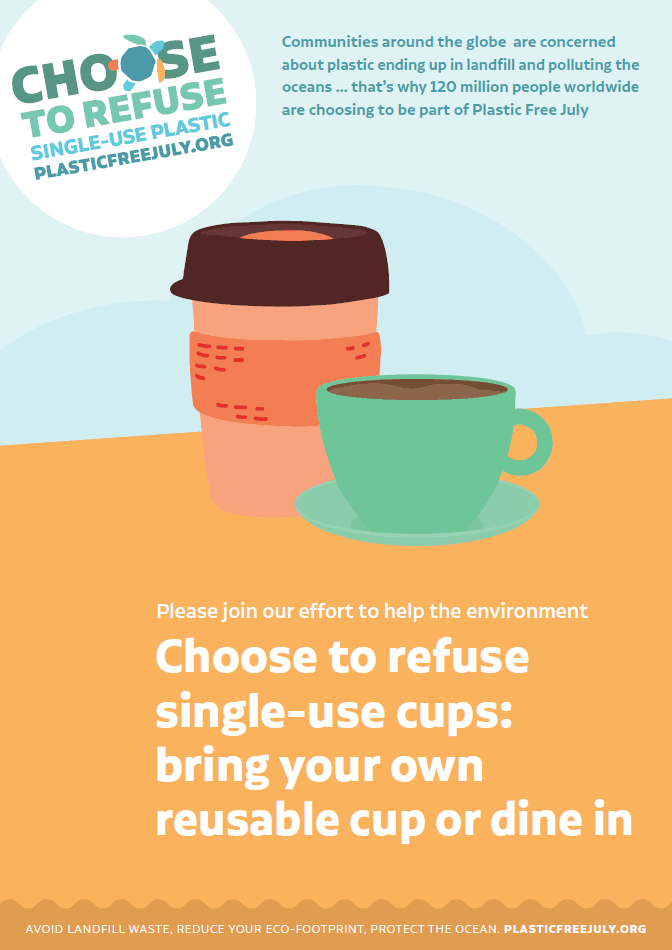
(You can find the whole range of official Plastic Free July posters – free to download – on the Plastic Free July website.)
Maybe it means giving a talk to your colleagues or your community, organizing a litter pick-up or hosting a movie screening.
Maybe it means writing to companies expressing your annoyance with their packaging and suggestive alternatives, or writing to companies to tell them you love their commitment to reducing waste.
Maybe it means writing to your local councillor or MP to ask them what they are doing about plastic pollution.
Use your voice to speak up for what matters, and share what you know.
Be The Kind of Person You’d Have Liked Supporting You in the Early Days
Chances are, if you’ve been living plastic-free for a while, you’ve ventured down the rabbit hole and discovered a whole heap of twists and turns along the journey.
There are probably plenty of choices you made and things you did back at the start that with the benefit of hindsight, you wouldn’t do again.
Try to remember this when you see others making similar choices. You have the benefit of hindsight, and they don’t. Yet.
How would you have felt if you’d triumphantly shared your first plastic-free chocolate bar purchase that took you three weeks to track down, only to be told that a) didn’t you know that particular Fair Trade organic bar is made by a multinational company b) it’s probably not vegan c) haven’t you heard of palm oil d) you didn’t buy it in the supermarket, surely e) did you even look at the carbon footprint?
It’s unlikely you’d feel inspired to continue, that’s for sure.
Part of the journey is trying new things and making mistakes. If you see someone sharing a choice they made that you wouldn’t make, before diving in to “help”, ask yourself: how helpful will it really be for you to share your opinion right now?
This is particularly true on the internet, with people you don’t know. No-one wants to be berated in public by someone they’ve never met and who has no idea about their individual circumstances.
That’s not to say that we can’t or shouldn’t share information. Just be sensitive about what you share, who you share it with and how you share it.
People need time to find their own way. That first Plastic Free July can be overwhelming. As someone who has gone ahead, we can try to remember that, be encouraging, inclusive, and celebrate the small wins of others.
If we want people to feel confident to take the next steps, we need to be supportive with the first steps.
Challenges such as Plastic Free July are not just for beginners, but we all start as beginners. If you are a beginner, I want to assure you that whilst change can be challenging, it is also fun… and very rewarding. Those ahead of you are here to help when you get stuck – we have all been stuck at some point! If you are a veteran, remember that part of our challenge is continuing to push ourselves, not get complacent and help keep the spark alight in those just starting out.
Happy Plastic Free July, everyone!
Now I’d love to hear from you! Are you a plastic-free newbie? A veteran with one year’s service? Two or three year’s service? Four or more years of service? If you’re a veteran, what do you remember most about starting out? Do you remember?! And what advice would you give to someone taking the challenge for the first time? Any other thoughts or ideas? Please share your comments below!
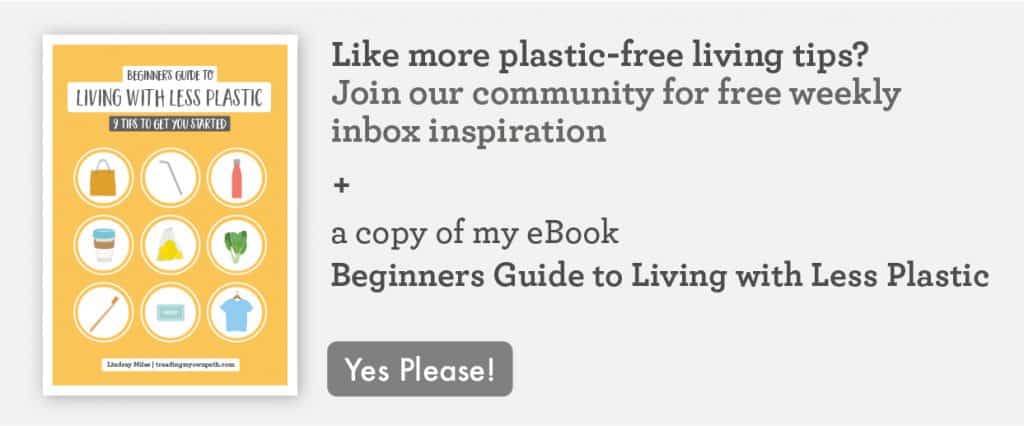
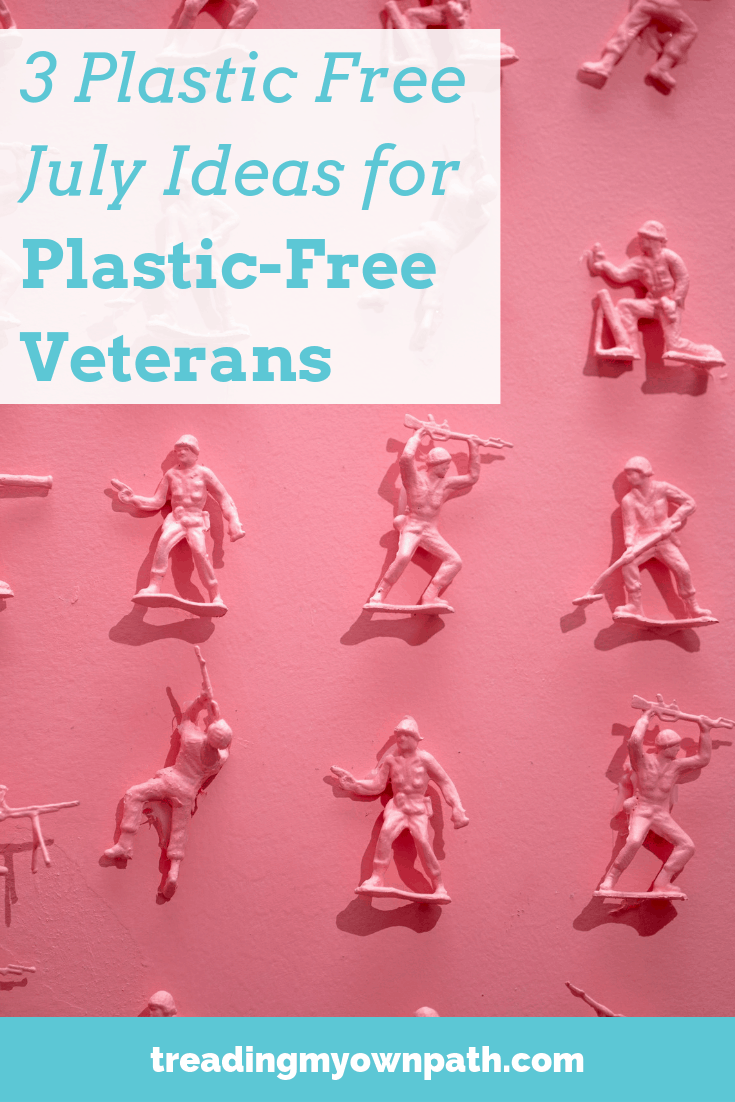
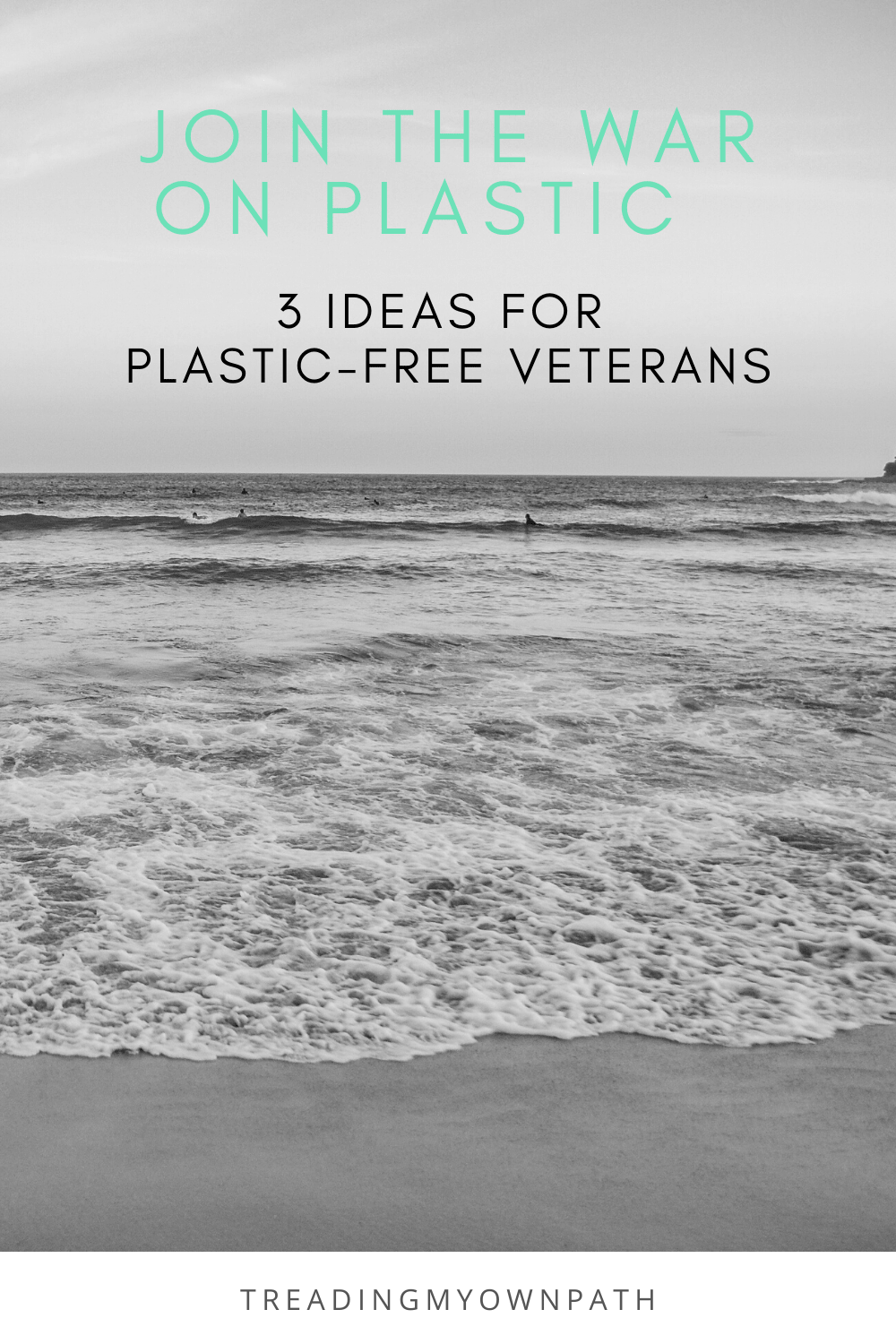
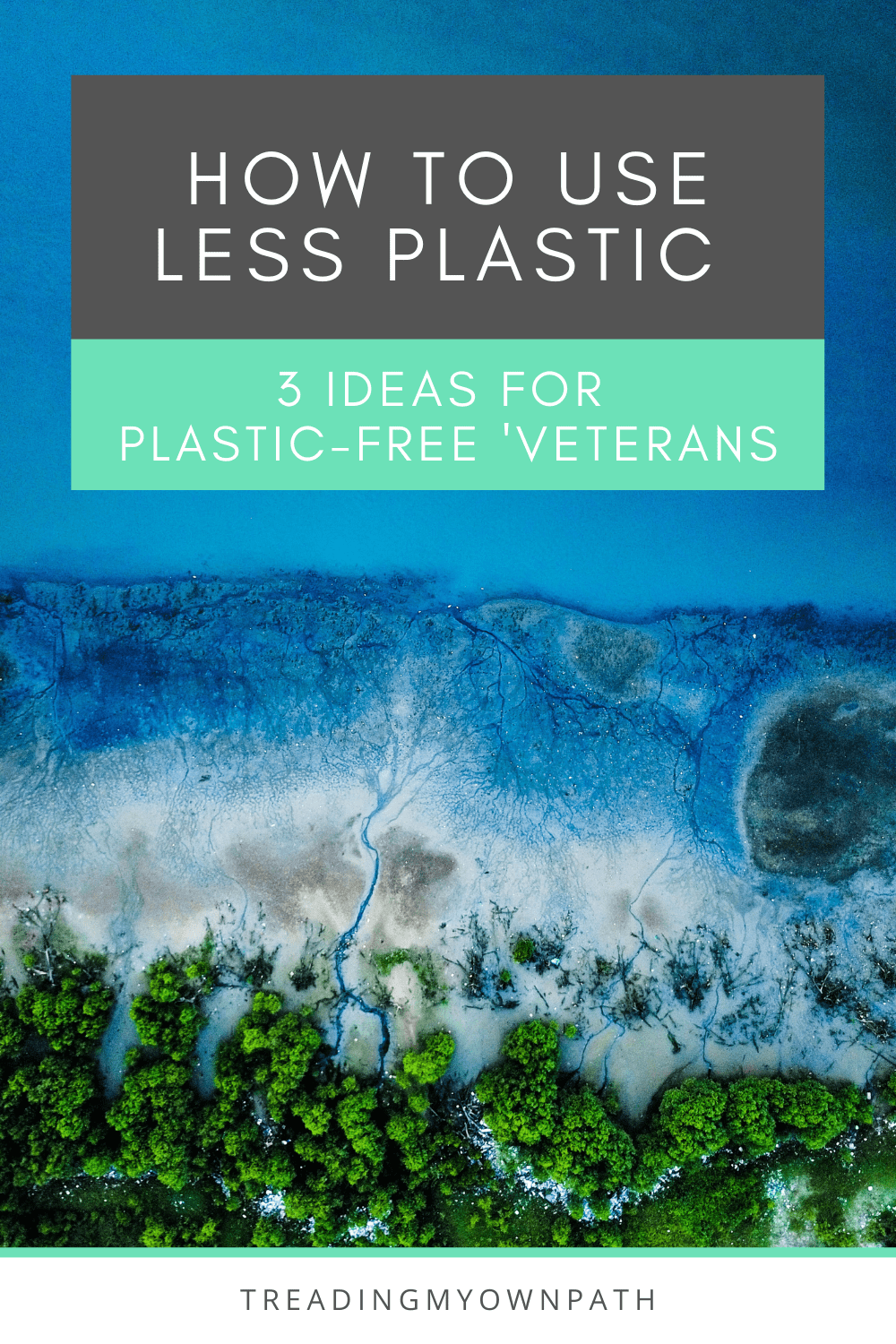
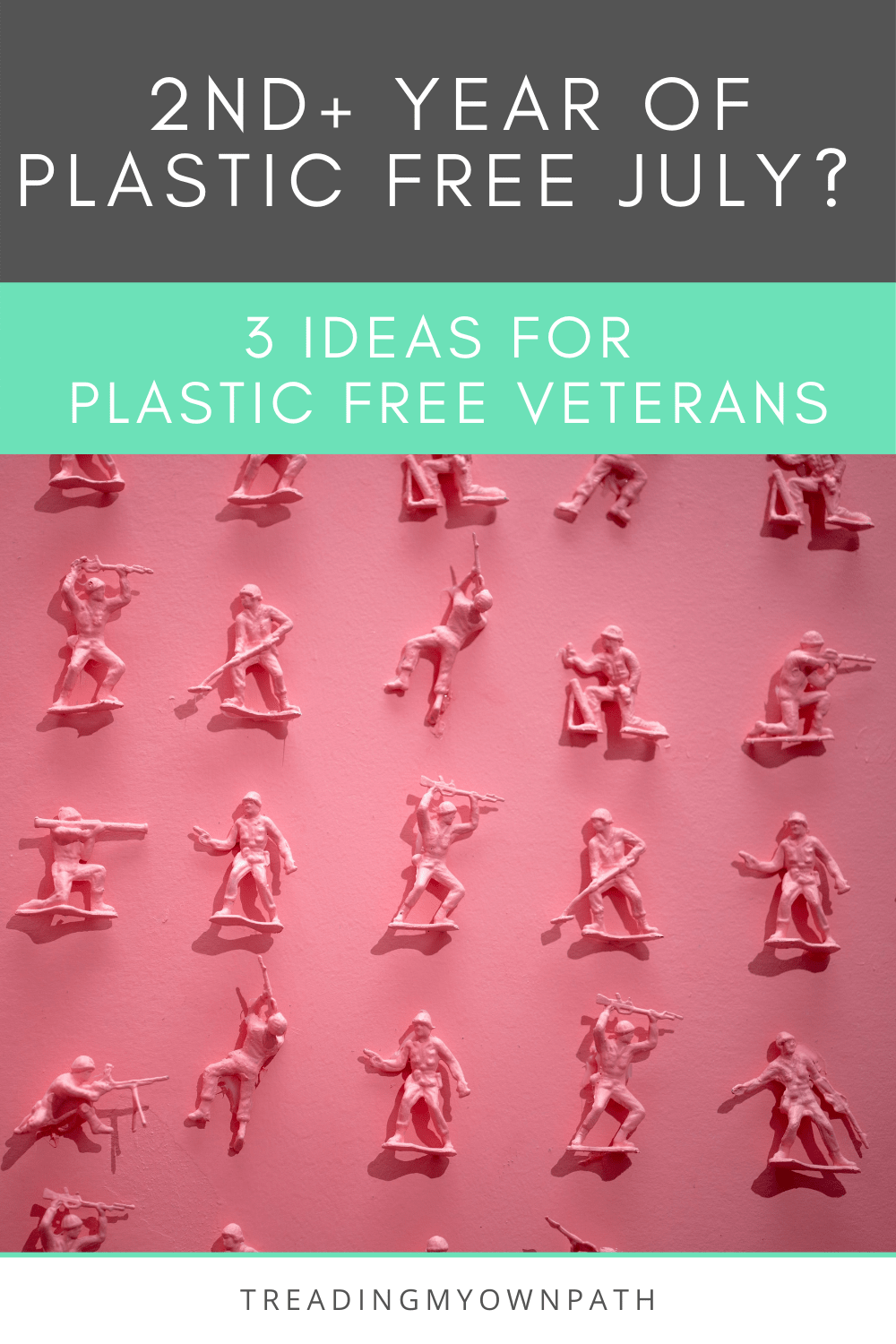

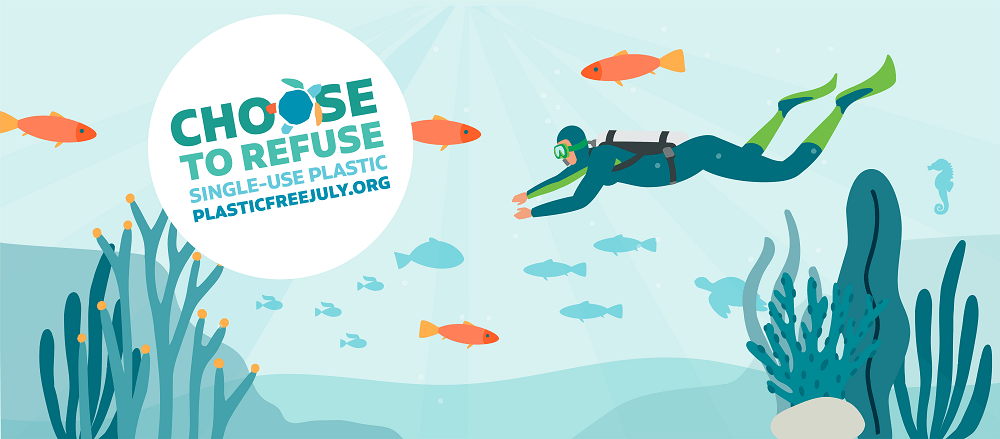


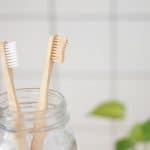

I’ve been trying to reduce the amount of plastic I use for a while now (possibly a year?), and every month or two I swap something out that I can make myself. I’m now using reusable drinking straws, glass milk bottles, making my own yogurt, making my own granola, making my own strawberry jam to flavour yogurt for my daughter, making my own meringues, making my own pasta, and using the packaging free shop near work. It’s really hard work, all that cooking, but as I work part time I feel I ought to make the effort with my free time to do something useful for the environment.
The problem I have is that you can’t tick all the boxes, like your example of the problems with the chocolate bar. I’d like to cut down on dairy, but I can only find cows milk in glass bottles. Dairly free comes in tetrapacks, which I don’t want to use. Also, I can’t get a decent taste and texture from homemade yogurt unless it’s with cows milk (I have tried homemade almond, shop-bought almond and homemade oat milks). You have to pick your battles, and I’m not bothering with some of the issues you highlighted with the chocolate bar right now. They are important issues (but isn’t everything?), but I do have to enjoy my life without too much stress, or it is no life to live. Everything in moderation, and cutting back on harmful stuff seems to suit me, whether it’s plastic use or alcohol use, environmental causes or personal health. Balance is hard to find, but you need to be happy that each little nudge doesn’t whack something else out of kilter.
So, my target for July is to try to make my own soap. I buy bars of soap from well-being festivals, and they are in paper anyway, but I have a lavender bush and a few rose bushes in the garden which might be good to try, and I can borrow a book I have seen on my friend’s bookshelf to help me get started. Now I just need to hope that not all the ingredients come in plastic bags!
Signed up, will do my best, but i live with others so i cant eliminate plastic for whole household (i dont own the house, parents do)
definitely will be trying to level up this july! thankfully, our farmer’s market is open and full of lovely things at this time of year…
my primary target this time is trying to get some local restaurants on board with using customer-supplied takeaway containers. takeaway lunch is a huge business in our community, and some offices do regular large orders. returnable, reusable containers, either office owned or restaurant owned, could help tremendously in waste reduction. many restaurants have declined to use my own containers to fill takeaway orders, citing worries about hygiene (except the local sushi bar, which happily uses my lacquerware bento boxes), but i think they will be more willing to work with bulk orders potentially. we’ll see!
i also hope to do a couple of informational workshops for free in the community to bring awareness of plastic reduction options to more people. as picnic, barbecue, and boating season ramps up, the amount of single -use product waste increases correspondingly, and this is another area ripe for tackling.
finally, several of us are asking local/regional organisations that focus on protecting watercourses to look at creating initiatives for return to non-plastic fishing nets and other equipment for our marine industries. drift nets are a particular problem in the chesapeake bay, and plastic net and float fragments travel throughout the estuarine systems.
My local sushi shop is really happy to put sushi in my lunchbox too, which is great! We have also worked out which supermarket delis are willing to fill containers we’ve brought from home and which ones aren’t.
I think everyone that’s on this journey finds it a challenge and hopefully fun.
I have always disliked plastic and am currently trying to replace the plastic in my life with an alternative where possible.
I now buy my milk in glass bottles from the milkman, make my own deodorant cleaning products and use bar soap .
Going to try soap nuts next for my washing.
Good luck everyone and I love everyone’s comments. Always something new to learn.
Eve
This will be my third Plastic Free July and I’m looking forward to it!
Since July 2017 I now make my own toothpaste and mouthwash, I also bake bread and am currently learning to make good veggie burgers. And I went vegan in Veganuary 2019 so that’s helped a lot with the non-plastic buying :-)
My husband and I are up to our third Plastic Free July too. We’ve got lots of great habits in place and only a few waste issues we haven’t been able to solve: we can’t find anywhere to buy cow’s milk in glass bottles, we’re not sure what to do with our collection of bottle caps, and we have to throw away aluminium foil because it’s not accepted for recycling by our council.
From our first Plastic-Free July, I remember having to give up individually wrapped muesli bars and getting used to stocking up on bulk snacks or making our own. I remember thinking it would take years to build up a big enough jar collection for all our bulk staples (we’ve now got plenty!) and use up all the food in the pantry that was in single-use plastic (it’s long gone), and that plastic-free living would be so difficult if we didn’t have The Source Bulk Foods in town.
Last year, I went to a great Plastic-Free July event where one presenter talked through lots of swaps and a new mum explained how she looks after her baby with reusable nappies and wipes. We’re about to have a baby, so that will definitely be our new plastic-free challenge.
I have been on the no-poo journey (that’s no shampoo for the uninitiated!) for a couple of years now, and having been through a wide variety of shampoo alternatives, the only thing I use now to clean my hair is half an egg! So that’s no more shampoo bottles ever again :-)
I have also recently discovered beeswax wraps which are great for replacing clingfilm. I use them all the time for wrapping lunches, and things like cheese and to cover dishes of leftovers in the fridge. Brilliant for a half-cut lemon or onion. They don’t usually even need washing after use – I just give them a good wipe over. Experimenting with making my own from fabric offcuts – a bit messy but good fun!
Another recent thing is taking my own containers to the supermarket, something I tried years ago with little luck. It can still be a challenge to persuade retailers to let you use your own containers for produce, but this is quite a new thing and will take a while to become normal practice. Now that some supermarkets are offering this, it hopefully won’t be long before they all get on board. We just need to keep the faith and keep asking the questions.
I hadn’t heard of Plastic-Free July until signing up for Lindsay’s blog, but will be looking at it this year for more ways to step up my plastic reduction.